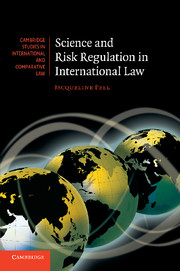Book contents
- Frontmatter
- Contents
- Preface
- Acknowledgements
- 1 Introduction: science and risk regulation in international law
- 2 Global risk governance and its legitimacy
- 3 Scientific rationality and risk in international law
- 4 Competing risk regulatory paradigms: sound science and the precautionary principle
- 5 Science and WTO regulation of SPS risk
- 6 Case studies of science and risk regulation in international law
- 7 Democratising global risk governance
- 8 What role for science in international risk regulation?
- Index
- CAMBRIDGE STUDIES IN INTERNATIONAL AND COMPARATIVE LAW
Preface
Published online by Cambridge University Press: 10 January 2011
- Frontmatter
- Contents
- Preface
- Acknowledgements
- 1 Introduction: science and risk regulation in international law
- 2 Global risk governance and its legitimacy
- 3 Scientific rationality and risk in international law
- 4 Competing risk regulatory paradigms: sound science and the precautionary principle
- 5 Science and WTO regulation of SPS risk
- 6 Case studies of science and risk regulation in international law
- 7 Democratising global risk governance
- 8 What role for science in international risk regulation?
- Index
- CAMBRIDGE STUDIES IN INTERNATIONAL AND COMPARATIVE LAW
Summary
In our modern, industrialised world science is the way we have come to know and understand risks to our health and the environment. These risks range from the potential cancer-causing properties of traces of chemical contaminants in foodstuffs, to large-scale challenges, such as reducing the effects and managing the impacts of worldwide climate change. Most such risks are seen as having a global dimension, whether because of the potential for broad-ranging effects on human and environmental systems (as in the case of climate change) or because globalised processes of trade and commerce have the capacity to disseminate widely potential risks associated with particular products (for instance, genetically modified crops). In response to these factors, requirements for risk regulation have proliferated in international law and global governance, with science and expert processes of risk assessment as their basis.
As international law has come to take on a more important role in the governance of risk, it is exercising greater influence over key aspects of risk regulation, such as the role of science in assessing and managing health and environmental risks. Science is considered by most to be a necessary component of risk regulation, especially when dealing with risks to human health and the environment that would otherwise be difficult to perceive and comprehend. However, science and expertise hold less power than in the past to legitimate the exercise of governing authority.
- Type
- Chapter
- Information
- Science and Risk Regulation in International Law , pp. vii - ixPublisher: Cambridge University PressPrint publication year: 2010



